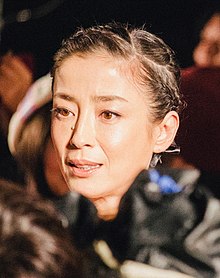
Back ريم ميازاوا Arabic ريم ميازاوا ARZ Rie Miyazawa German Rie Miyazawa Spanish ریه میازاوا Persian Rie Miyazawa French ריאה מיאזווה HE Rie Miyazawa ID Rie Miyazawa Italian 宮沢りえ Japanese
Rie Miyazawa | |||||
|---|---|---|---|---|---|
宮沢 りえ | |||||
 Rie Miyazawa at the 27th Tokyo International Film Festival | |||||
| Born | April 6, 1973 Tokyo, Japan | ||||
| Nationality | Japanese | ||||
| Occupations |
| ||||
| Years active | 1985–present | ||||
| Height | 167 cm (5 ft 5+1⁄2 in) | ||||
| Spouse | |||||
| Musical career | |||||
| Genres | |||||
| Instrument |
| ||||
| Labels | |||||
| Japanese name | |||||
| Kanji | 宮沢 りえ | ||||
| Hiragana | みやざわ りえ | ||||
| |||||
Rie Miyazawa (宮沢 りえ, Miyazawa Rie, born April 6, 1973) is a Japanese actress and former idol singer.[1][2] She is regarded as one of Japan's top actresses, and her accolades include six Japan Academy Film Prizes and three Kinema Junpo Awards.
Miyazawa began her career as a child model, seeing wide exposure as the original face of Mitsui Rehouse, and made her acting debut in the 1988 film Seven Day's War, for which she won the Japan Academy Award for Newcomer of the Year at age 16. Her short-lived music career began with the single "Dream Rush" in 1989, and the next year she performed at the prestigious Kōhaku Uta Gassen television special.
Miyazawa quickly rose to prominence as one of the top idols of the early Heisei period, attracting controversy for her 1991 nude photography book Santa Fe, which moved 1.5 million copies. Her personal struggles were further scrutinized, including a high-profile engagement to sumo wrestler Takanohana, a suicide attempt and battle with anorexia nervosa.[3] By 1996, she went into hiatus and briefly resettled in the United States.[4]
She took on a few television drama roles in the late 1990s, and returned to the big screen in the Taiwanese films The Cabbie (2000) and Peony Pavilion (2001). She co-starred in the highly-acclaimed 2002 film The Twilight Samurai, which marked a full-fledged comeback for Miyazawa and remains as her most recognizable role both domestically and internationally. She saw further success in The Face of Jizo and Tony Takitani (2004), and received several accolades for Pale Moon (2014) and Her Love Boils Bathwater (2016).
- ^ "Rie MIyazawa" Archived September 23, 2011, at the Wayback Machine Naver (in Japanese)
- ^ "Activities of Rie Miyazawa" Naver (in Japanese)
- ^ 「宮沢りえは彼女の"作品"だった」りえママの豪腕伝説 Cyzo, February 2009 (in Japanese)
- ^ "美少女・宮沢りえを「大女優」にした男はだれだったのか? | AERA dot. (アエラドット)". AERA dot. (アエラドット) (in Japanese). October 16, 2019. Retrieved August 31, 2024.